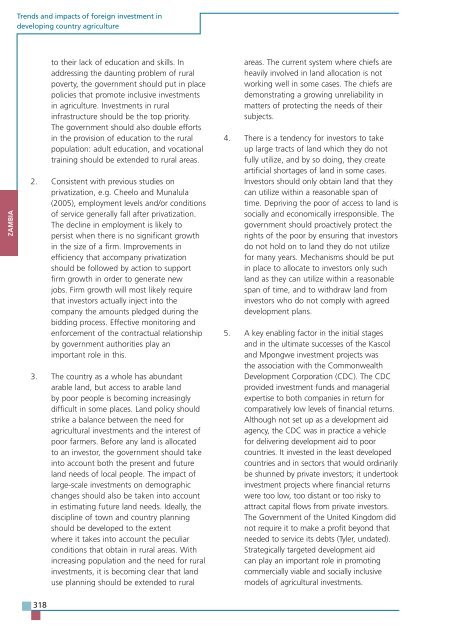TRENDS AND IMPACTS OF FOREIGN INVESTMENT IN DEVELOPING COUNTRY AGRICULTURE
TRENDS AND IMPACTS OF FOREIGN INVESTMENT IN DEVELOPING COUNTRY AGRICULTURE
TRENDS AND IMPACTS OF FOREIGN INVESTMENT IN DEVELOPING COUNTRY AGRICULTURE
Create successful ePaper yourself
Turn your PDF publications into a flip-book with our unique Google optimized e-Paper software.
ZAMBIA<br />
Trends and impacts of foreign investment in<br />
developing country agriculture<br />
318<br />
to their lack of education and skills. In<br />
addressing the daunting problem of rural<br />
poverty, the government should put in place<br />
policies that promote inclusive investments<br />
in agriculture. Investments in rural<br />
infrastructure should be the top priority.<br />
The government should also double efforts<br />
in the provision of education to the rural<br />
population: adult education, and vocational<br />
training should be extended to rural areas.<br />
2. Consistent with previous studies on<br />
privatization, e.g. Cheelo and Munalula<br />
(2005), employment levels and/or conditions<br />
of service generally fall after privatization.<br />
The decline in employment is likely to<br />
persist when there is no significant growth<br />
in the size of a firm. Improvements in<br />
efficiency that accompany privatization<br />
should be followed by action to support<br />
firm growth in order to generate new<br />
jobs. Firm growth will most likely require<br />
that investors actually inject into the<br />
company the amounts pledged during the<br />
bidding process. Effective monitoring and<br />
enforcement of the contractual relationship<br />
by government authorities play an<br />
important role in this.<br />
3. The country as a whole has abundant<br />
arable land, but access to arable land<br />
by poor people is becoming increasingly<br />
difficult in some places. Land policy should<br />
strike a balance between the need for<br />
agricultural investments and the interest of<br />
poor farmers. Before any land is allocated<br />
to an investor, the government should take<br />
into account both the present and future<br />
land needs of local people. The impact of<br />
large-scale investments on demographic<br />
changes should also be taken into account<br />
in estimating future land needs. Ideally, the<br />
discipline of town and country planning<br />
should be developed to the extent<br />
where it takes into account the peculiar<br />
conditions that obtain in rural areas. With<br />
increasing population and the need for rural<br />
investments, it is becoming clear that land<br />
use planning should be extended to rural<br />
areas. The current system where chiefs are<br />
heavily involved in land allocation is not<br />
working well in some cases. The chiefs are<br />
demonstrating a growing unreliability in<br />
matters of protecting the needs of their<br />
subjects.<br />
4. There is a tendency for investors to take<br />
up large tracts of land which they do not<br />
fully utilize, and by so doing, they create<br />
artificial shortages of land in some cases.<br />
Investors should only obtain land that they<br />
can utilize within a reasonable span of<br />
time. Depriving the poor of access to land is<br />
socially and economically irresponsible. The<br />
government should proactively protect the<br />
rights of the poor by ensuring that investors<br />
do not hold on to land they do not utilize<br />
for many years. Mechanisms should be put<br />
in place to allocate to investors only such<br />
land as they can utilize within a reasonable<br />
span of time, and to withdraw land from<br />
investors who do not comply with agreed<br />
development plans.<br />
5. A key enabling factor in the initial stages<br />
and in the ultimate successes of the Kascol<br />
and Mpongwe investment projects was<br />
the association with the Commonwealth<br />
Development Corporation (CDC). The CDC<br />
provided investment funds and managerial<br />
expertise to both companies in return for<br />
comparatively low levels of financial returns.<br />
Although not set up as a development aid<br />
agency, the CDC was in practice a vehicle<br />
for delivering development aid to poor<br />
countries. It invested in the least developed<br />
countries and in sectors that would ordinarily<br />
be shunned by private investors; it undertook<br />
investment projects where financial returns<br />
were too low, too distant or too risky to<br />
attract capital flows from private investors.<br />
The Government of the United Kingdom did<br />
not require it to make a profit beyond that<br />
needed to service its debts (Tyler, undated).<br />
Strategically targeted development aid<br />
can play an important role in promoting<br />
commercially viable and socially inclusive<br />
models of agricultural investments.


